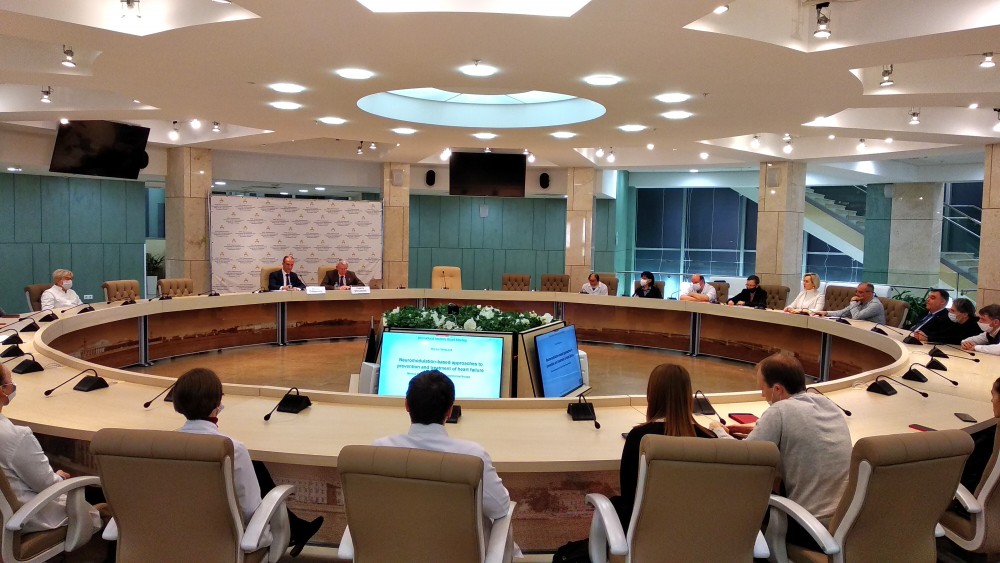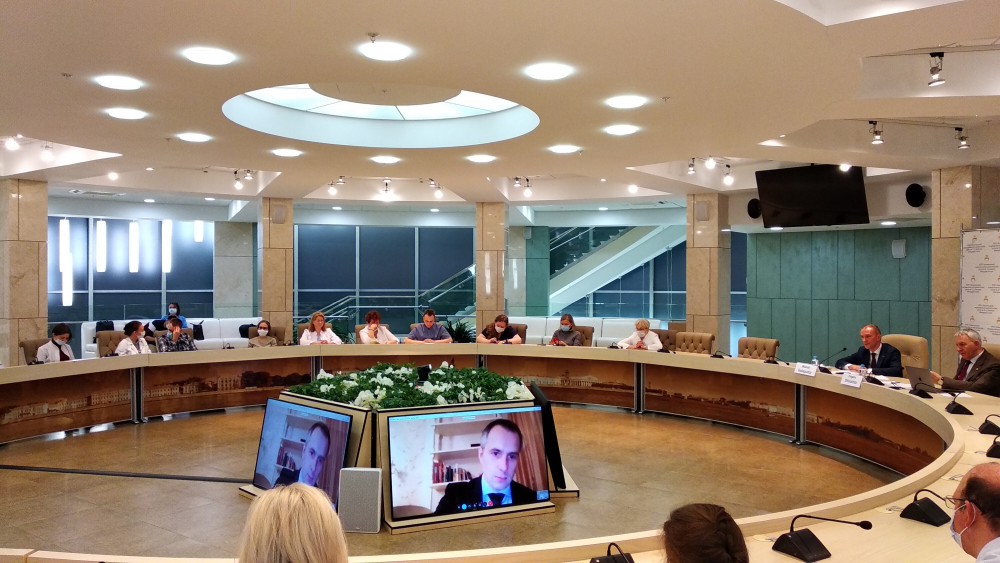
On January 19, Director General of Almazov Centre Evgeny Shlyakhto chaired the International Expert Meeting on the project “Development of new technologies for the prevention and treatment of heart failure based on neuromodulation” carried out by the Centre’s team under agreement No. 075-15-2020 -800 dated 09/24/2020 with the Ministry of Science and Higher Education of the Russian Federation. The members of the International Expert Council are prominent experts in heart failure: professors S. Anker, A. Coats, F. Mahfoud.
In his opening speech Evgeny Shlyakhto emphasized the great social significance of the heart failure problem in the modern world and the importance of translational and basic research aimed at introducing the latest achievements into practice. Director of the Institute of Experimental Medicine, Corresponding Member of the Russian Academy of Sciences Mikhail Galagudza and Deputy Director of the Institute of Heart and Vessels Evgeny Mikhailov gave presentations. They spoke about the main results obtained from the project last year, plans for 2022, new approaches and scientific tasks.

Heart failure affects more than 28 million patients worldwide and is increasing in prevalence. Despite certain progress in the prevention and treatment of this condition, the prognosis in most patients remains poor, which dictates the need to find new ways to improve treatment outcomes.
The main goal of the project is to study the fundamental mechanisms of the autonomic nervous system involved in the pathogenesis of circulatory diseases and to develop new technologies for the prevention and treatment of heart failure based on neuromodulation. In 2021, the project team obtained priority research data presented in 13 publications in leading international journals (Journal of Clinical Investigation, Journal of Cardiovascular Translational Research, Scientific Reports, International Journal of Molecular Sciences, BMC Pulmonary Medicine, etc.) and four successfully defended PhD theses.
A 3D mathematical model of ischemia-reperfusion injury in the rat and human heart was developed, making it possible to predict and heed the effect of adipose tissue hormones and vagal stimulation on the process of myocardial damage and the formation of rhythm disturbances. Experimental studies on rodents have shown that a prolonged increase in leptin concentration associates with an aggravated severity of ischemic damage to the myocardium, an increased incidence of rhythm disturbances, an increased degree of myocardial hypertrophy and systemic inflammation. Vagal nerve stimulation attenuates myocardial ischemia damage and has an antiarrhythmic effect. The experiments with modeling of primary pulmonary hypertension and chronic thromboembolic pulmonary hypertension have shown that the elimination of sympathetic effects on the heart and lungs is associated with decreased manifestations of this condition and reduces morphological signs of wall hypertrophy of the smaller branches of the pulmonary artery. New molecular mechanisms associated with the favorable effects of sympathetic denervation on the course of pulmonary hypertension were identified. A new large animal model of atrial fibrillation was developed and validated using high-frequency burst pacing of certain cardiac structures.
New data on the types and prevalence of orthostatic reactions in patients with heart failure were obtained. Research is underway to study the management of arterial hypotension, including orthostatic hypotension, in patients with and without severe heart failure, with indications for heart transplantation. New data were obtained on the possibility of using transcutaneous electrical spinal cord stimulation to correct hypotension.
New approaches are being developed to the pulmonary and renal artery denervation methods on models of pulmonary and systemic arterial hypertension. Classification of damage to the vascular wall and perivascular nerves during denervation procedures was established. The classification was internationally reviewed and allows for a standardized assessment of new denervation methods. Work has started on transvascular laser ablation of perivascular nerves in the treatment of chronic CVDs with a high risk of developing heart failure (stage A). New data have been obtained on the risk of impaired renal function associated with a pronounced blood pressure lowering effect after renal denervation.
In experimental studies on parasympathetic denervation of the heart, the effect of impaired autonomic regulation on exercise tolerance was studied for the first time and it was proved that regular physical training helps to partially restore autonomic nervous activity (heart rate variability) and improve exercise tolerance. This may be especially true for patients with autonomic dysfunction syndromes and after heart transplantation when complete organ denervation is observed.
Based on a large clinical material, an assessment was made to identify serious deficiencies in predicting survival and cardiovascular events in Russian patients with chronic heart failure. Based on the analysis of a complex of biochemical and clinical parameters, new region-specific risk prediction models, including for patients receiving high-tech medical care using cardiac implantable electrophysiological devices (stages C and D according to the modern classification) were developed. A scale for predicting the development of heart failure in the medium term was developed for patients with diabetes mellitus, cardiovascular risks, those receiving combination therapy, including with SGLT2 inhibitors.
The findings obtained from this translational research project show scientific novelty and practical importance and can be directly introduced into clinical practice.
The Expert Council noted the significant scope of tasks as well as the exceptional methodological and scientific potential of the research. Internationally recognized experts highly praised the well-coordinated work of the project team (105 participants in 2021). Professors Anker, Coats and Mahfoud made proposals for the modification and expansion of some aspects of experimental and clinical research for 2022, expressed their wishes for the early implementation of developments in the practice.
